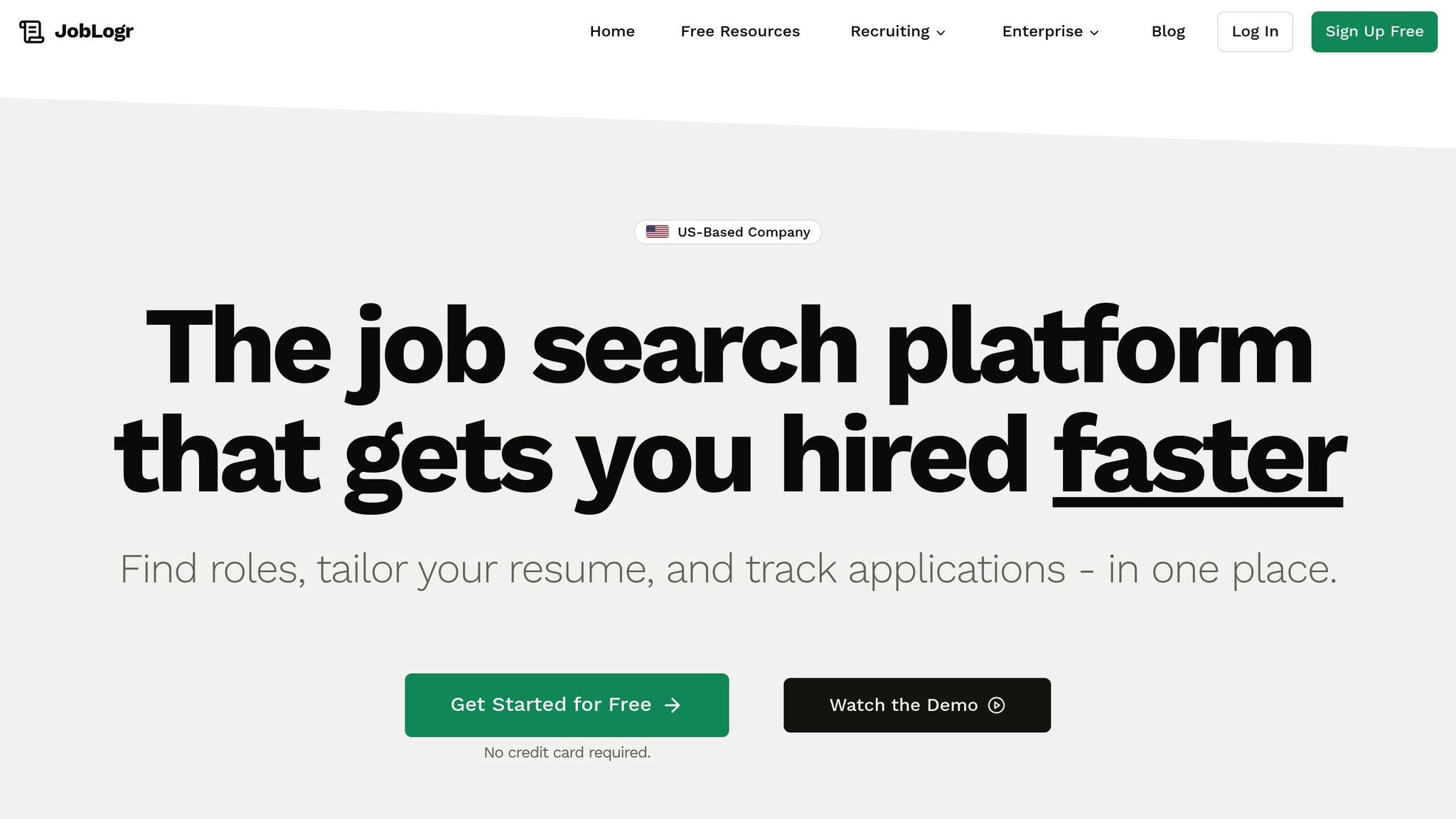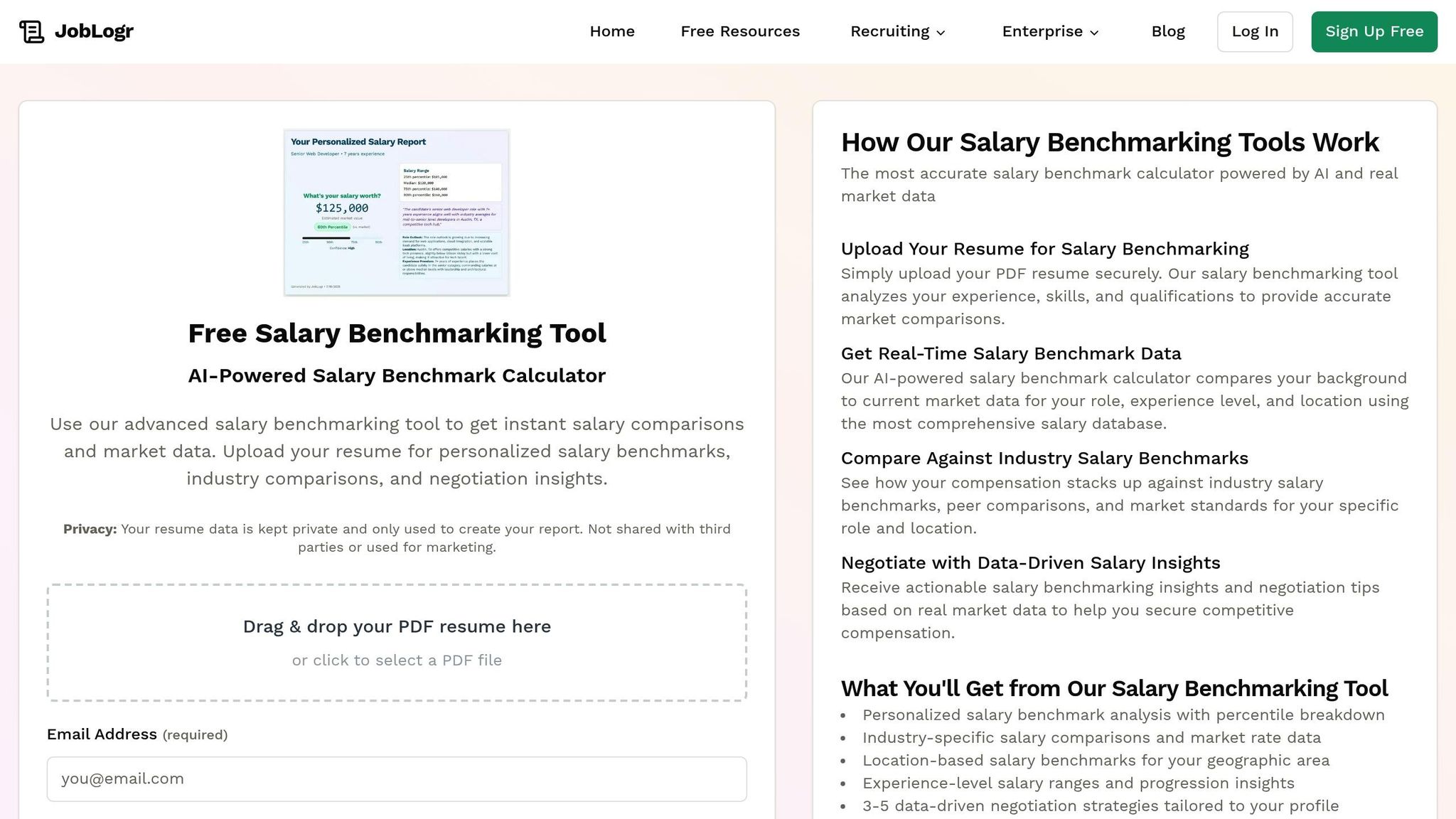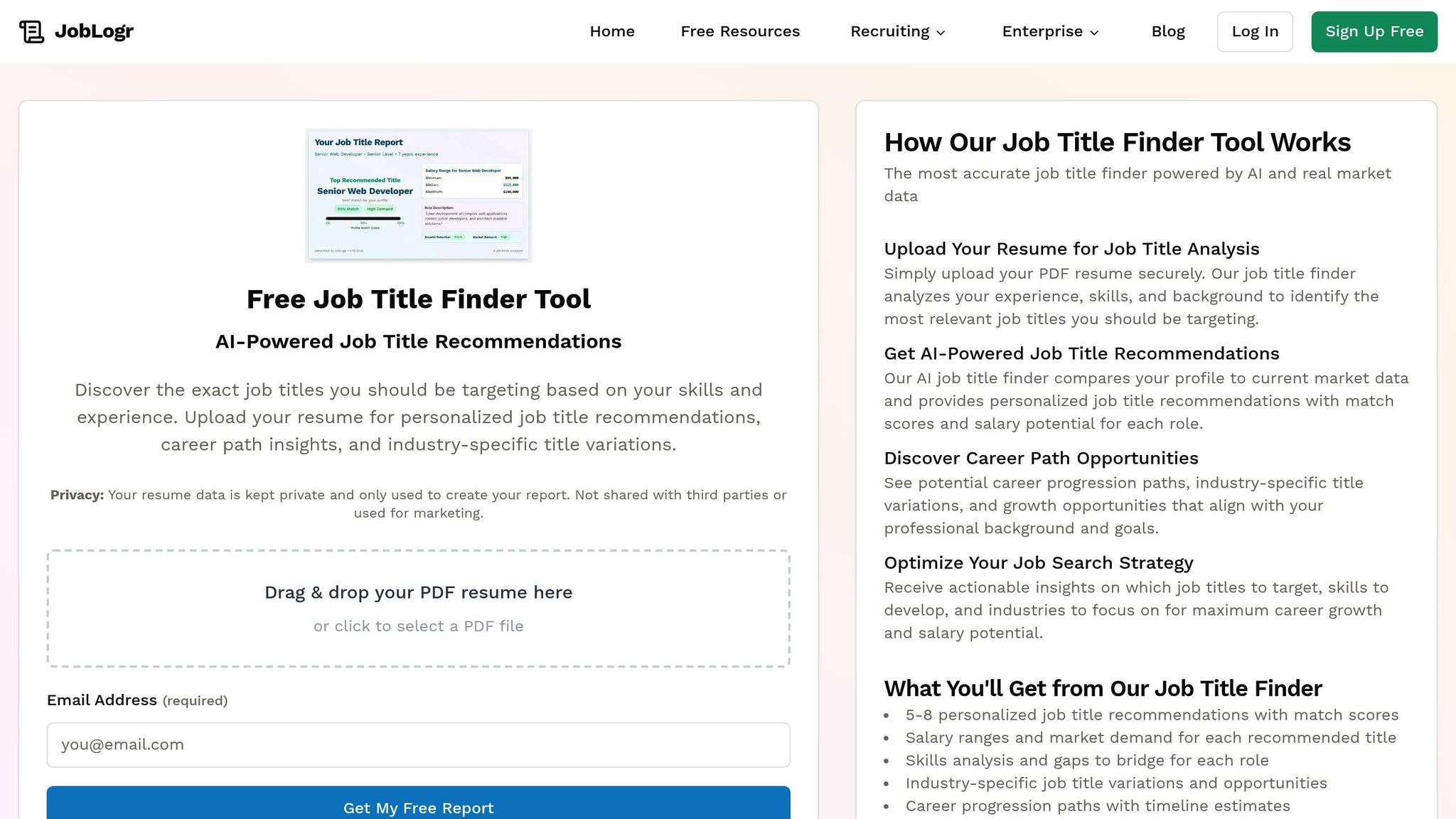
How Long Does it Take to Get a Job?
Finding a job often takes longer than expected, with the average search in the U.S. lasting about 19.9 weeks. Several factors influence this timeline, including your experience, skills, and market demand. Economic conditions, company hiring processes, and your job search strategy also play a role.
Each week of unemployment can cost you hundreds - or even thousands - in lost income. For example, a $60,000 annual salary means losing $1,154 per week, while a $100,000 salary means forfeiting $1,923 per week. Over months, these losses add up significantly, impacting your financial stability.
To shorten your search, focus on tailored applications, networking, and modern tools like JobLogr. Its AI features - such as resume optimization, application tracking, and interview prep - help you apply faster and more effectively. A shorter search not only saves money but also positions you for earlier career growth and financial recovery.
Want to calculate your potential savings? Try JobLogr’s Time Saver Calculator to see how reducing your job search time can directly impact your wallet.
How Long It Takes to Find a Job
Job Search Duration Statistics
In the U.S., job searches often span several months, with the timeline largely influenced by your experience, skills, and the job market's demand. Entry-level candidates and those transitioning to new careers might experience longer searches than professionals with highly sought-after expertise. Additionally, job opportunities in large metropolitan areas tend to arise faster than in smaller cities or rural regions. These general trends provide a foundation for understanding the factors that can impact how long it takes to secure a position.
What Affects Job Search Length
Several elements play a role in how long it takes to land a job. Economic conditions are a major factor - during slower market periods, the process may take longer. On the other hand, adopting an active and strategic approach to your search can help speed things up. Being open to remote work or relocation can also expand your options and reduce the time it takes to find a suitable role.
Your approach to job hunting matters, too. Networking with professionals, securing referrals, and using modern tools like AI-driven platforms can yield quicker results compared to relying solely on traditional methods such as job boards or company websites. The quality of your application is another critical factor. A well-tailored resume and cover letter are far more likely to grab attention than generic submissions, which can delay responses.
Lastly, the hiring process itself can vary widely. Smaller companies may move quickly, while larger corporations often have multi-step interview processes that take more time. By understanding these variables and refining your strategy, you can minimize delays and get closer to starting your next job - and paycheck - sooner.
The Cost of Long Job Searches
Income Lost from Delays
Every week you spend unemployed isn’t just a gap in your schedule - it’s a hit to your wallet. The financial toll of an extended job search goes beyond missing a paycheck; it snowballs, shaking up your financial footing.
Let’s break it down: if you’re aiming for a position with an annual salary of $60,000, each week without work costs you around $1,154 in lost income. If your target salary is $100,000, that number jumps to $1,923 each week. Over time, these losses add up fast. For instance, six months of job searching at a $60,000 salary means forfeiting roughly $15,000. For a $100,000 salary, you’re looking at losses that could exceed $25,000.
Beyond the numbers, extended unemployment can force tough financial choices. You might drain your emergency savings, see your credit score take a hit, or feel the mounting stress of unpaid bills piling up. The longer the delay, the harder it becomes to recover.
Why Finding Jobs Faster Saves Money
Cutting even a single week off your job search can make a huge difference. It’s not just about halting financial losses - it’s about setting yourself up for long-term success.
Starting work sooner means more than just getting a paycheck earlier. It gives you a head start on building tenure at your new company, which can lead to earlier performance reviews, raises, and promotion opportunities. Those extra weeks of income also help you avoid dipping into savings, taking on debt, or falling behind on bills.
A shorter search timeline can also boost your confidence during salary negotiations. When you’re not feeling the pinch of financial stress, you’re in a better position to negotiate a salary that matches your worth instead of settling for less just to stop the financial strain.
Want to see how much you’re really leaving on the table? Use JobLogr’s Time Saver Calculator to calculate exactly how much each week of unemployment is costing you. It’s a clear way to see why investing in smarter job search strategies pays off - not just emotionally, but financially.
Why Your Job Search Takes Months: Fix Your Process Now!
How JobLogr's AI Tools Speed Up Hiring

JobLogr's AI-powered platform takes the hassle out of the traditional job search by automating many of the tedious tasks that typically slow you down. Instead of spending hours hunting for jobs, tweaking resumes, or tracking applications, JobLogr lets you focus on what really matters - landing the right job.
The platform simplifies the process by continuously monitoring job postings that match your preferences and delivering tailored opportunities straight to your dashboard. By cutting out the manual work, you can concentrate on high-impact activities like networking and interview preparation.
Time Saver Calculator: See How Much Time (and Money) You Save
One standout feature is JobLogr’s Time Saver Calculator, available right on their homepage. This tool helps you figure out how much faster you can secure a job - and start earning - by using their platform. It highlights the financial benefits of reducing your job search time, like getting paid sooner, gaining access to employee benefits earlier, and advancing your career without delay. Every week you save on your search could mean thousands of dollars in salary you’d otherwise miss out on.
AI Features That Make Job Searches Faster
JobLogr’s AI tools are designed to tackle the most time-consuming parts of job hunting, helping you move through the process faster and more efficiently. Here’s how they work:
- Smart resume optimization: The AI scans job postings and adjusts your resume to showcase the skills and experience that matter most for each role.
- Custom cover letters: Automatically generate tailored cover letters that address specific job requirements, saving you hours of writing.
- Application tracker: Keep all your submissions organized in one place, with reminders to follow up so you don’t miss out on opportunities.
- Interview prep tools: Get a leg up on interviews with guided practice sessions and insights into common questions for your target roles.
sbb-itb-6487feb
Free Tools to Improve Your Job Search
JobLogr offers a suite of free tools designed to streamline your job search process. These resources tackle common challenges like understanding your market value, discovering new opportunities, and staying organized.
Salary Benchmark Tool

The Salary Benchmark Tool from JobLogr uses AI to analyze your resume and experience, helping you secure competitive offers right from the start.
Here's how it works: upload your PDF resume, and the tool compares it against extensive salary databases. The result? Personalized benchmarks that provide real-time insights into how your compensation stacks up against industry standards, peer groups, and market rates tailored to your role and location. This isn't just generic data - it's specific to your unique skills, background, and qualifications.
But it doesn't stop there. You'll also receive a percentile breakdown, showing exactly where you fall within the salary range for your position. Plus, the tool provides 3-5 actionable negotiation strategies based on your profile. These strategies are designed to help you confidently approach salary discussions with solid data to back you up. You'll even get tips on how to boost your market value and earning potential over time.
And don't worry about privacy - your resume data stays secure. It's used exclusively to generate your report and is never shared or used for marketing purposes.
Job Title Finder

Sticking to familiar job titles can limit your options. JobLogr’s Job Title Finder expands your horizons by suggesting roles that align with your skills and experience, even if they’re not titles you’ve previously considered.
This tool is especially helpful for career changers, recent grads, or anyone navigating industries where new roles are constantly emerging. By analyzing your background, the tool identifies positions you might not have thought of, saving you time and uncovering fresh opportunities.
Each suggestion includes context, explaining how your skills fit the role and why it could be a good match. This insight is a game-changer when tailoring applications or preparing for interviews, making it easier to communicate your fit for the role.
Once you've discovered these new opportunities, JobLogr’s organization tools can help you stay on track.
Job Application Tracker
Managing multiple applications can quickly become overwhelming. JobLogr’s Job Application Tracker simplifies this process by keeping everything in one central hub, so no opportunity slips through the cracks.
The tracker includes automated follow-up reminders, helping you stay on top of deadlines and next steps. You can monitor the status of each application, track interview dates, and jot down notes about each role. This level of organization is crucial when you're juggling several applications and need to keep important details straight.
It also provides valuable insights into your job search. You can identify patterns, like which types of applications get responses or how long companies typically take to reply. These insights allow you to refine your strategy and focus on the most promising opportunities.
Plus, having all your application details in one place is a lifesaver during interviews. You can quickly review your materials, remind yourself why you were excited about the role, and reference specific points from your cover letter or earlier conversations.
How to Speed Up Your Job Search: Best Practices
Losing income and dealing with long job search timelines can be frustrating. But by using a more focused approach and the right tools, you can cut down on the time it takes to land your next opportunity.
Proven Methods for Faster Job Searches
- Network with purpose: Instead of attending every event, focus on building meaningful connections in your target industry. Reach out to former colleagues, school alumni, or professionals in roles you admire. Personalize your messages to show genuine interest - it makes a difference.
- Customize your applications: Sending out generic resumes won’t get you far. Take the time to tailor your resume to each job description and craft a cover letter that directly addresses the company's needs. This extra effort makes your application more likely to stand out.
- Apply as soon as possible: Many job postings get flooded with applications soon after they go live. Set up job alerts and check them regularly so you can be among the first to apply when new opportunities pop up.
- Follow up professionally: Don’t just submit your application and wait. A short, polite follow-up message can remind the hiring team of your interest and help your application get noticed.
- Stay organized: Keep track of where you’ve applied and how each company responds. This helps you identify which strategies are working and allows you to focus your efforts on the most promising opportunities.
To make things even easier, consider using tools like JobLogr to streamline your job search and improve your results.
Using JobLogr's Tools for Better Results
JobLogr’s AI-powered platform takes some of the heavy lifting off your plate. Its automated job search feature continuously scans for new openings in your field, ensuring you don’t miss out on fresh opportunities.
The platform also helps you customize resumes and cover letters with ease, so you can apply faster without sacrificing quality. Plus, it offers tools like a Salary Benchmark Tool, Job Title Finder, and Job Application Tracker to keep you organized and informed.
With a 7-day free trial and a money-back guarantee, JobLogr lets you try these features without any risk. Finding a job faster not only saves time but also gets you back to earning sooner - which could make the monthly subscription well worth it.
Conclusion: Start Your Smarter Job Search Today
Every week you spend searching for a job comes with a real cost. In the U.S., the average job search stretches to 19.9 weeks. For someone earning $1,200 per week, that adds up to nearly $24,000 in lost income during that time. That’s not just a number - it’s money that could pay your bills, grow your savings, or fund your future plans.
But here's the good news: you can shorten that timeline with the right tools and strategies. JobLogr's Time Saver Calculator, available on their homepage, shows exactly how much you could save by landing a job just a few weeks sooner. The results might surprise you. And that’s just one of the many resources JobLogr offers to make your search more effective.
Take advantage of JobLogr's free tools like the Salary Benchmark Tool, Job Title Finder, and Job Application Tracker. These resources simplify the process and keep you organized, so you can focus on landing the right role.
Here’s the math: cutting your job search by just four weeks saves you $4,800 if you’re earning $1,200 a week. With JobLogr’s 7-day free trial, you can explore features like automated job searches and resume optimization risk-free. These tools are designed to help you work smarter and get results faster.
Why wait? Streamline your job search, land your next role sooner, and start earning again. Turn what could be a long, drawn-out process into an efficient and rewarding journey with JobLogr. Start today and take control of your future.
FAQs
How do economic conditions impact how long it takes to find a job?
Economic conditions heavily influence how long it might take to land a job in the United States. When the economy faces challenges - like high inflation, climbing interest rates, or market instability - companies often pump the brakes on hiring. They may scale back job openings or tighten their hiring criteria, which can stretch out the job search process for candidates.
In tough economic times or after mass layoffs, the job market becomes even more competitive. With fewer positions available and a larger pool of job seekers, standing out can be harder. If you've been out of work for a while, the search can feel even more daunting. However, staying proactive and leveraging tools to organize and streamline your job hunt can help you tackle these hurdles and potentially shorten the time it takes to secure a role.
What are the best networking strategies to help me find a job faster?
Networking can play a huge role in speeding up your job search by opening doors to opportunities you might not find through traditional methods. To get started, consider attending industry meetups, joining professional groups, and staying active on platforms like LinkedIn. The key here is to focus on building real relationships rather than simply seeking favors.
Another smart approach is to request informational interviews. These one-on-one conversations not only help you learn about potential roles but can also lead to referrals. Many jobs are never posted publicly, so these chats can give you access to opportunities that stay under the radar. Approach networking with sincerity and patience - building strong connections takes time, but they can be a game-changer in your job search.
How does JobLogr's AI make your job search faster and easier?
JobLogr uses AI to take the hassle out of your job search by automating time-consuming tasks like prioritizing job applications, customizing your submissions to align with specific job requirements, and keeping track of your progress in real time. These tools ensure you can concentrate on the opportunities that matter most and navigate the hiring process more smoothly.
By cutting down the time spent searching and applying, JobLogr helps you land a job faster - potentially saving you thousands of dollars in lost income during your job hunt. It’s an efficient way to secure your next role.